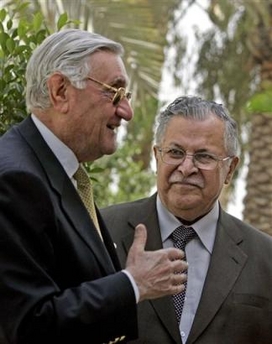|
Baghdad locks down for parliament session
(AP)
Updated: 2006-03-16 16:07 On the eve of the first
session of Iraq's new parliament and within days of the third anniversary of the
U.S.-led invasion, vehicles were banned from Baghdad's streets to prevent car
bombings, the country lay under the shadow of a feared civil war and politicians
reported a stalemate over the next government.

Iraqi President
Jalal Talabani, right, escorts Sunni Arab politician Adnan al-Pachachi to
a meeting of various Iraqi leaders in Baghdad, Iraq, Wednesday, March 15,
2006. After members of all the major Iraqi political blocs met Tuesday
with U.S. Ambassador Zalmay Khalilzad, no breakthrough was reported on
solving the deadlock over the nomination of al-Jaafari to head a new
government. Once parliament meets on March 16, 2006, it has 60 days under
the new constitution to elect a president and approve the nomination of
Shiite Prime Minister Ibrahim al-Jaafari and his Cabinet.
[AP] | Continuing divisions among lawmakers suggested
Thursday's opening session of the legislature may do little more than swear in
members elected in landmark elections three months earlier.
There was little sign of progress after a second full day of meetings among
leaders of the major political blocs. U.S. Ambassador Zalmay Khalilzad brokered
the sessions, designed to speed agreement on the next government's shape.
"I expect that there still will be difficulties over choosing the prime
minister," said Mahmoud Othman, a Kurdish politician who was in Wednesday's
session.
Khalilzad has be pressing political leaders to reach agreement on a national
unity government, under which the country's majority Shiite Muslims would share
Cabinet posts equitably with minority Sunnis and Kurds.
The Americans see that as the best opportunity for blunting the insurgency
that has ravaged the country since 2003. If a strong central government were in
place, Washington had hoped to start removing some troops by summer.
Under the constitution, the largest parliamentary bloc, controlled by
Shiites, has the right to nominate the prime minister. The Shiites named the
current prime minister, Ibrahim al-Jaafari.
Politicians involved in the negotiations have said part of the Shiite bloc,
those aligned with Abdul-Aziz al-Hakim, would like to see al-Jaafari ousted but
fear the consequences, given his backing from radical cleric Muqtada al-Sadr and
al-Sadr's thousands-strong Mahdi Army.
Meanwhile, the U.S. military dispatched a battalion of soldiers from the 2nd
Brigade, 1st Armored Division 锟斤拷 about 700 troops 锟斤拷 to Iraq from its base in
Kuwait to provide extra security for Shiite holy cities as tens of thousands of
pilgrims converged for a major religious commemoration that came under attack in
the two previous years.
Monday marks the end of the 40-day mourning period after the death of Imam
Hussein in 680 A.D. He was the grandson of the Prophet Muhammad and was killed
in Karbala in present-day Iraq, now the site of massive Shiite pilgrimages to
mark the date.
The day also marks the third anniversary since the U.S.-led invasion of Iraq
on March 20, 2003.
Authorities in one of the Shiite holy cities, Karbala, imposed a six-day
driving ban starting Thursday in a bid to protect pilgrims this year.
Iraqi police, meanwhile, found 25 bodies discarded in various parts of
Baghdad, the Interior Ministry said Thursday, part of a wave of apparent
sectarian killing.
The bodies 锟斤拷 all men who had been shot 锟斤拷 were discovered in both Shiite and
Sunni Muslim neighborhoods, said Lt. Col. Falah al-Mohammedawi, an Interior
Ministry official. The men were in civilian clothes and many had their hands
bound.
In violence Wednesday, a U.S. airstrike north of the capital killed 11 people
锟斤拷 most of them women and children, said police and relatives of the victims. The
U.S. military said it captured the target of the raid, a man suspected of
supporting foreign fighters of the al-Qaida in Iraq terror network.
But the military said only four people were killed 锟斤拷 a man, two women and a
child.
"Troops were engaged by enemy fire as they approached the building," said
Tech. Sgt. Stacy Simon, a military spokeswoman. "Coalition forces returned fire
utilizing both air and ground assets."
Police Capt. Laith Mohammed said the attack near Balad, 50 miles north of
Baghdad, involved U.S. warplanes and armor that flattened a house in the village
of Isahaqi. An Associated Press reporter at the scene said the roof of the house
had collapsed, three cars were destroyed and two cows were killed.
Relatives said the 11 victims were wrapped in blankets and driven in three
pickup trucks to the Tikrit General Hospital, about 45 miles to the north.
AP photographs showed the bodies of two men, five children and four other
covered figures arriving at the hospital accompanied by grief-stricken
relatives. The victims were covered in dust with bits of rubble tangled in their
hair.
Riyadh Majid, who identified himself as the nephew of Faez Khalaf, the head
of the household who was killed, told AP at the hospital that U.S. forces landed
in helicopters and raided the home early Wednesday.
Khalaf's brother, Ahmed, said nine of the victims were family members who
lived at the house and two were visitors.
"The dead family was not part of the resistance, they were women and
children," he said. "The Americans have promised us a better life, but we get
only death."
In other violence, the military said a U.S. soldier was killed by mortar fire
southwest of Baghdad about 6:30 p.m.
At least 2,311 members of the U.S. military have died since the beginning of
the Iraq war in March 2003, according to an Associated Press count.
Bomb blasts also killed at least five more people and injured dozens
Wednesday in Baghdad and north of the capital. The worst attacks were in
Baqouba, 35 miles northeast of Baghdad, where there were at least three
explosions.
|